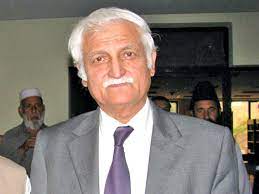PPP calls for abolishing death penalty

Liaquat Ali
Islamabad: On the eve of ‘World Day Against Death Penalty’ Tuesday the Pakistan People’s Party (PPP) has called for abolishing the death penalty.
“Until the death penalty is abolished as a result of a larger public debate on the efficacy of death penalty in deterring crime the victims be given right to proper defence and protected against torture for extracting confession”, said a statement issued today by the President of the Human Rights Cell of the PPP former Senator Farhatullah Babar.
The number of crimes carrying the death penalty must be drastically decreased from the present 33 and juveniles and mentally challenged persons be spared from execution. Legal and consular services to migrant Pakistani workers be ensured and the procedure for mercy petitions against executions streamlined, he said.
He said that studies showed that Pakistan executed only the poorest and the most marginalized whose fair trial rights were often violated and convicts were tortured in the broken criminal justice system. Highlighting it he said that sometime back two brothers accused of murder were acquitted by the Supreme Court after years on death row but only after they had been hanged.
It is shameful that in such a broken criminal justice system the senate committee recently passed a private member bill calling for public hangings, he said and called for immediate withdrawal of the proposed amendment
He said that after the APS massacre in December 2014 there was a public outcry to hang the terrorists. However over 85 % of the executions carried out thereafter were for ordinary crimes and not related to terrorism, he said.
He said that states abolishing the death penalty have increased and more and more Muslim countries had placed moratorium on executions but in Pakistan the number of crimes carrying the death penalty had progressively increased.
He said that as murder was punishable with death or life imprisonment a measure of arbitrariness in giving death penalty was unavoidable. The Supreme Court has held that death is usual punishment, but there are also court judgments calling for ‘justice with mercy’ and that reasons must be recorded why a judge, he said.
He said that the Quran stressed mercy and forgiveness. The Quranic injunction ‘in just retribution there is life for you’ (2:179) was a subtle suggestion that ‘ qisas’ (retribution) was not revenge but protection of life. The Quran emphasized life, not revenge, he said.
Death penalty is irreversible, has doubtful deterrence value and militates against the poor. The fact that a large number of convictions are set aside on appeal showed that the death penalty resulted in appalling miscarriage of justice, he said.





